Originally published in the Spring 2024 issue of Eastman NOTES
By Anna Reguero
It’s 4:34 p.m. on a Saturday afternoon in late September when Jamal Rossi, the Joan and Martin Messinger Dean of the Eastman School of Music and a 1987 alumnus of the school, presses send on an email informing the Eastman community about the passing of a recently retired and well-loved colleague. Not even an hour later, he arrives at Max of Eastman Place, the upscale restaurant on the first floor of the Miller Center building on Gibbs Street, to host a dinner party for new faculty. Such contrasts, even on a weekend, are common for the dean, who must lead the Eastman community in moments of exigency and celebration.
The hiring of new faculty is one of the legacies Rossi will leave as dean, a position he has held since 2013. Last summer, Rossi announced that he would not seek reappointment at the end of his current term, which concludes at the end of the 2023–24 academic year. Just this last academic year, Rossi hired 12 new faculty members, with four more vacancies to fill this current year. Over his tenure at Eastman, Dean Rossi will have hired more than 60 percent of the school’s faculty members, leaving Eastman with a whole new generation of teachers to lead the century-old school into its next 100 years. With the help of dedicated faculty committees, Rossi has always sought “to bring people into the community who add dimension and depth and make it special,” he says. “I’ve tried to foster a community where people are invested in the school and invested in each other.”
The new faculty dinner is an important event to build a rapport with new faculty and create an atmosphere of community. As the new faculty members enter the restaurant for the dinner, Rossi greets each with a personalized comment, assuring one that he is looking forward to their first concert of the semester, and congratulating another on a recently published book. “Every one of you is so special, and we are truly excited that you have chosen to be members of this community,” he said in a pre-dinner acknowledgement. It was a moment of celebration.
Returning to Eastman
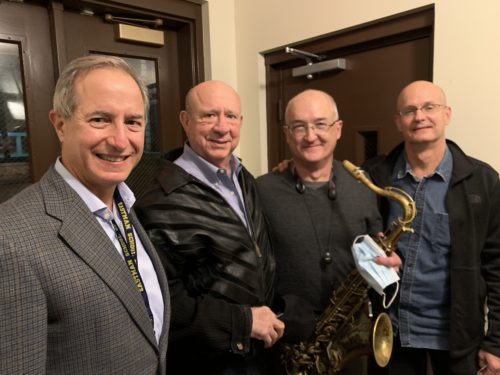
Jamal Rossi (left) with his saxophone teacher and mentor, Ramon Ricker (right of Jamal).
Higher education administration wasn’t part of Rossi’s original vision for his career; he wanted to be an outstanding saxophonist and professor. In pursuit of this, he earned the Doctor of Musical Arts in Saxophone Performance and Literature degree at Eastman, studying with Ramon Ricker. “Besides being the absolute right teacher for me at the right time in my life, Ray went on to become one of my most trusted mentors and friends,” said Rossi. Another important influence in Rossi’s life was his graduate advisor, Jon Engberg. In addition to serving as Eastman’s Associate Director and Associate Dean for Graduate Studies for 22 years, Engberg was an accomplished cellist. Rossi recalls taking the city bus from Irondequoit to Rochester every morning and arriving at Eastman just before 8:00 a.m. As he walked down the main hall (now Lowry Hall), he would hear the sounds of Engberg’s cello drifting into the academic corridor.
“I could perhaps see myself doing that someday,” Rossi thought. Little did he know that he would return to Eastman 20 years later and occupy the same office as Dr. Engberg, his graduate mentor, and now, friend.
Following his second year of the DMA degree, Rossi began his academic career with a one-year sabbatical leave position at the University of North Carolina at Wilmington, followed by a full-time position at Northern State College (now University) in Aberdeen, South Dakota. “Having grown up outside of Philadelphia, Aberdeen seemed like the middle of nowhere. However, my wife and I loved the community, and I relished the work I was doing with very good students.”
While at Northern State, Rossi was approached by the dean of Ithaca College, where Rossi had earned his undergraduate degree, to return to Ithaca as the director of admissions. While the prospect of returning to a school Rossi cared about and in a geographic area that was near family was appealing, Rossi turned down the opportunity. One year later, he was approached again about serving as the assistant dean. This appealing opportunity created a crossroad decision about remaining on a professorial track or moving to full-time administration. Ultimately, with the opportunity to work with one of Rossi’s most influential mentors, Arthur Ostrander, and the assurance that he would be able to pursue artistic opportunities, Rossi accepted. It was a decision that started his trajectory back to Eastman and prepared him for the work ahead.
One of his major projects at Ithaca College was overseeing the construction of a large
addition that doubled the footprint of the music school. Rossi served as the school’s liaison with the architects and contractors. After 11 years as the assistant and associate dean at Ithaca, and the completion of the building expansion, Rossi was ready to take on a new challenge.
Not unlike his first missed opportunity to return to Ithaca, Rossi feared he had missed his opportunity to return to Eastman—not once, but twice.
Following Ithaca, Rossi accepted his first deanship at the University of South Carolina. However, the day after he signed the contract for the job, he received a call from James Undercofler, Eastman’s fifth dean who served from 1997 to 2006. There was an opening for the position of associate dean of academic affairs—was Rossi interested? Rossi had known Undercofler for several years, and the opportunity to work with him at Eastman was enticing. But, having just accepted the position at South Carolina, Rossi turned it down. “I thought, well, there goes my chance to ever return to Eastman,” he says.
A few years pass and Rossi received another phone call: The associate dean position was open yet again, was he interested?
“I really loved the work I was doing in South Carolina. I loved being the dean, and my colleagues and I were engaged in exciting initiatives. But here was a chance to be at one of the best schools in the world—a school I cared very much about, and to be back near our families.” Ultimately, he turned down the job, yet again. His son was entering his senior year in high school and Rossi could not uproot his family, nor could he bear to be away from his family for a year. “There goes Eastman again. That ship sailed,” he thought.
“Saying no to the opportunity to be at Eastman was a very difficult decision because I had so much respect for Jim, and I had a good sense of what he wanted to accomplish. I knew that I would have really enjoyed being a part of that team.”
A few months later, Dean Undercofler called once again. The position was still open. “Jim offered to hold the position for one year, which would allow me to begin at Eastman after my son graduated from high school. This was an incredibly generous offer that I could not pass up, and for which I will always be grateful.”
In one of his first meetings, Rossi recalls Undercofler sliding a large manila envelope across the table, and with a sly smile said, “it’s yours.” Inside were meeting notes regarding Renaissance Square, a Rochester downtown revitalization project that included a large performing arts center, and that had been under conversation for several years.
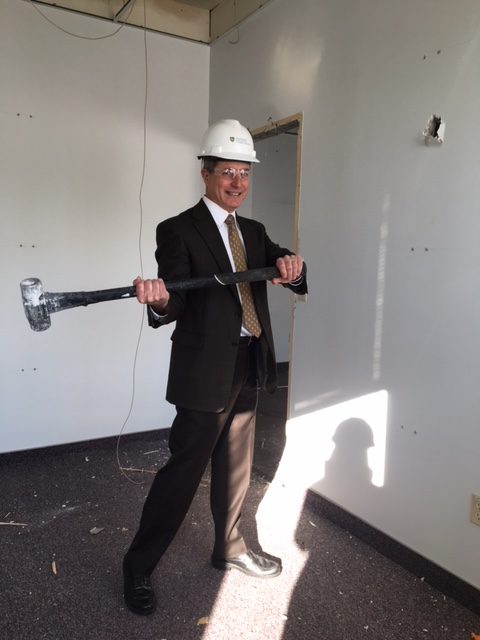
Jamal Rossi breaking ground during one of Eastman’s many renovation projects.
Renaissance Square never transpired, but working closely with newly appointed University of Rochester President Joel Seligman, Rossi and Seligman were able to secure funds from the project that had already been earmarked towards significant renovations to the Eastman Theatre. They were also successful in obtaining a remarkable gift from the Eastman Kodak Company to rename the performance space Kodak Hall at Eastman Theatre. Given the success of the fundraising during his time as Interim Dean, the project grew from renovating Eastman Theatre to also include building a much-needed addition, including the beautiful Hatch Recital Hall—something that had been articulated as a need at Eastman since the early 1970s. “The opportunity to oversee this project through to completion was a privilege. I’m proud of the work an extraordinary team of colleagues invested in renovating Eastman Theatre and expanding Eastman’s facilities.”
The completion of a historical capital project that altered the landscape of Rochester’s downtown was a moment of celebration.
Donna Brink Fox, who served as Senior Associate Dean of Academic and Student Affairs and worked closely with Rossi, admired the depth of knowledge that Rossi brought to the project, especially his ability to talk to engineers and architects.
“If you take that as a metaphor for his leadership style, it is about being analytical and constructivist,” she said.
“What I learned from the Ithaca project was the criticality of having somebody intimately familiar with how a music school functions serving as a strong liaison with the architects and contractors. Ultimately, it’s the details that matter,” says Rossi, “and you have to fight for those details.”
Becoming Dean
By the time Rossi was named Eastman’s seventh dean in 2014, he was already well-versed in the role. Rossi had been asked to step into Eastman’s top leadership position on a temporary basis on three previous occasions. Each time was on the heels of challenges for the school.
The first time came after Undercofler, Eastman’s then dean, resigned to become the president and chief executive officer of the Philadelphia Orchestra. The sudden announcement necessitated a quick response from Eastman to ensure continuity in leadership. Rossi, then the deputy dean of Eastman, and his family were standing atop Toronto’s CN Tower on vacation when Rossi answered a phone call from President Seligman to return to Rochester: Rossi was to be named Interim Dean the very next day. He served in that capacity for 15 months, during which time a national search was conducted that identified Douglas Lowry to become Eastman’s sixth dean.
The second time Rossi stepped up as acting dean, Eastman was facing two dire incidents simultaneously. In August 2011, an incoming student took his own life. Rossi called Dean Lowry at 2:30 a.m. to share the tragic news, but Lowry wasn’t available. He had been hospitalized that same evening, having just learned of a life-threatening medical diagnosis. Rossi stepped up again for much of the academic year while Dean Lowry was on medical leave, guiding and supporting the community through mourning and uncertainty.
Lowry recovered and returned to lead the school again—but resigned just nine days before his untimely death on October 2, 2013. Once again, Rossi assumed the role of dean to lead the school through the passing of a beloved friend and colleague to so many. “Dean Lowry’s passing was devastating for our community,” Rossi recalls. “While I was honored to be asked to lead our school, in each instance I stepped into situations that were far different than I would have ever hoped.”
Rossi plans for the school’s next dean to arrive under substantially better circumstances. “My goal is to leave the school in a position of strength for the next dean to arrive, be celebrated, and lead the school into a brilliant future.”
Building to the Centennial
When Rossi was appointed the Joan and Martin Messinger Dean in 2014, he quickly engaged faculty and staff in meetings and events to encourage all to offer input on the future of the school and, ultimately, build a strategic plan to get there.
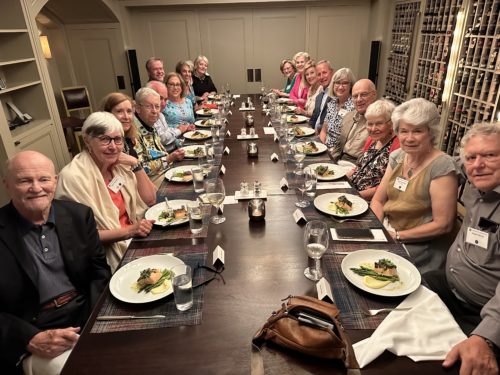
Dinner with Eastman friends and alumni.
“We hosted many events and gatherings with the invitation for our faculty and staff to share their dreams and aspirations for our school,” he remembers. “We had close to 60 meetings, including 10 dinners at my house with about 20 faculty and staff members at each one. I remember hand selecting each invitation list with the goal of bringing together people who don’t typically interact. My hope was to help foster personal connections that might lead to new friendships and possible collaborations.”
These conversations led to a new strategic plan in 2015 called Eastman 2021: Shaping the Future of Music with two overarching goals: to enhance the school’s international position as a preeminent school of music, and to secure its financial stability to put the school in a position of financial strength. It did so with its eye toward the milestone of Eastman’s centennial.
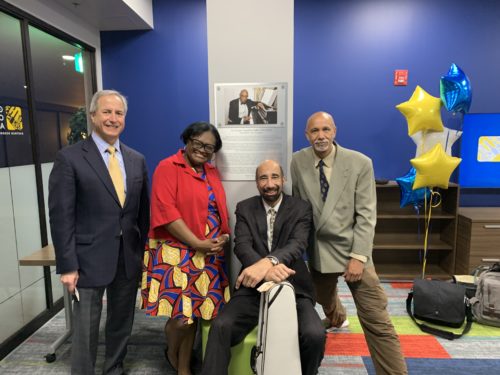
Dedicating the George Walker Center for Equity and Inclusion in Music with Crystal Sellers Battle, Gregory Walker, and Ian Walker. PC: Steph Vite-Romero
With the strategic plan as a roadmap, Eastman achieved many strategic initiatives that included the creation of several new institutes (Beal Institute for Film Music and Contemporary Media, the George Walker Center for Equity and Inclusion in Music, and Eastman Performing Arts Medicine) along with new degrees and certificates, (Master of Music in Contemporary Media/Film Composition, the Master of Arts in Music Leadership (fully online), and the Advanced Diploma in Performance). In addition to renewing or creating new conservatory exchange agreements between Eastman and 13 leading music schools and conservatories around the world, Eastman also supported student ensemble tours and performances in Austria, Canada, China, Czech Republic, Germany, Italy, Japan, Mexico, as well as throughout the US including the Kennedy Center, Lincoln Center, and Carnegie Hall.
Many Eastman facilities were renovated under Rossi’s leadership including Kilbourn Hall, Howard Hanson Recital Hall, Lowry Hall, the whole of the main building, the Student Living Center, and a major rebuild of Messinger Hall to finally serve as a worthy home of the Eastman Community Music School. While all these projects were supported through the philanthropy of generous donors, Rossi is most excited about the funds that have been raised to support students and faculty. Under Rossi’s leadership, Eastman received generous gifts to support 138 new endowed scholarships (in addition to adding significant gifts to 74 existing endowed scholarships) and created 11 new endowed professorships.
These things were accomplished despite the coronavirus pandemic that disrupted concerts, classes, and the entire workings of the school in 2020 and all the way into the school’s centennial year. Like all institutions across the globe, the University of Rochester had to determine how to keep its students, staff, and faculty safe while maintaining high educational standards. For music, this posed unique challenges given the primary means of spreading the virus was through aerosol transmission. Rossi expresses genuine gratitude to the leaders at Eastman and the University who found ways to enable students to continue making music during the pandemic, at a time when many others did not. “I could not have been prouder of the way the Eastman community pulled together to face a unique and massive challenge, and to do so with the commitment of keeping each other safe.”
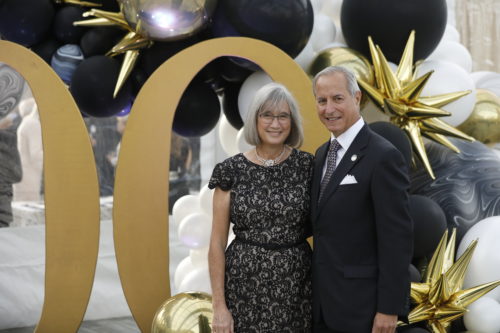
Pam and Jamal Rossi at the Centennial Celebrations. PC: Matt Wittmeyer
It all came to a height with Eastman’s centennial celebrations, beginning in fall 2021 and spanning through December 2022, which featured exceptional concerts, public celebrations, many guest artists, and special alumni events. A highlight was commissioning and premiering more than fifty new compositions written to commemorate the centennial. Additionally, Rossi’s leadership raised more than $72 million towards the Centennial Campaign’s $100 million goal, putting the school on sure footing for future generations of students and faculty.
It was one of the final moments of celebration for the outgoing dean.
“Serving as the Joan and Martin Messinger Dean of the Eastman School of Music has been the greatest honor of my life,” Rossi says. “The opportunity to work with tremendously talented and dedicated faculty and staff colleagues in service of educating future generations of musicians has been an extraordinary privilege. I am proud of all that the Eastman community has accomplished together over the past ten years, and I look forward to an exceptionally bright future for Eastman and the University.”
Celebrating With Community
Back at the new faculty dinner at Max of Eastman place in September, there’s an air of comradery when Eastman’s Senior Associate Dean of Academic and Student Affairs John Hain shows up.
Hain has worked closely with Dean Rossi on planning strategic directions for the school, forming international partnerships, and leading efforts for reaccreditation. Hain says that Rossi is almost old fashioned in his formalities, always sending thank you notes and remembering the birthdays of all his direct reports. Rossi even did drive-bys to deliver cookies and wine during COVID.
“He makes sure people know what a special place Eastman is. And every little detail matters,” says Hain.
At the dinner, they joke about their recent report submitted to the National Association of Schools of Music, a 900-page document that outlines all that Eastman offers its students and what is vital for Eastman’s future.
“It’s like the end of one of the Harry Potter books,” jokes Dean Rossi. “The story is not over yet, but there’s enough finality to celebrate.”
Similarly, Rossi’s impact as dean isn’t over yet, as he’s still busy investing in Eastman’s future. But there is more than enough to celebrate.
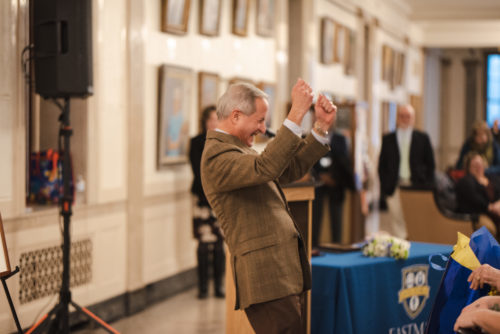
PC: Lauren Sageer
